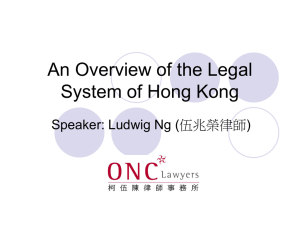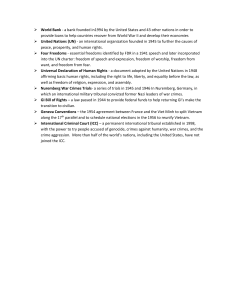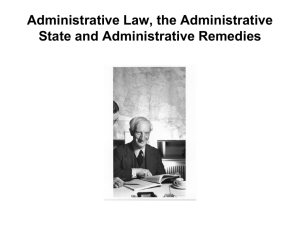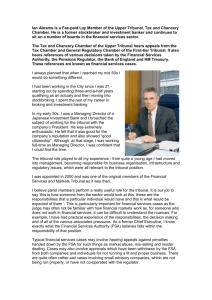House Armed Services Committee July 26, 2006
advertisement
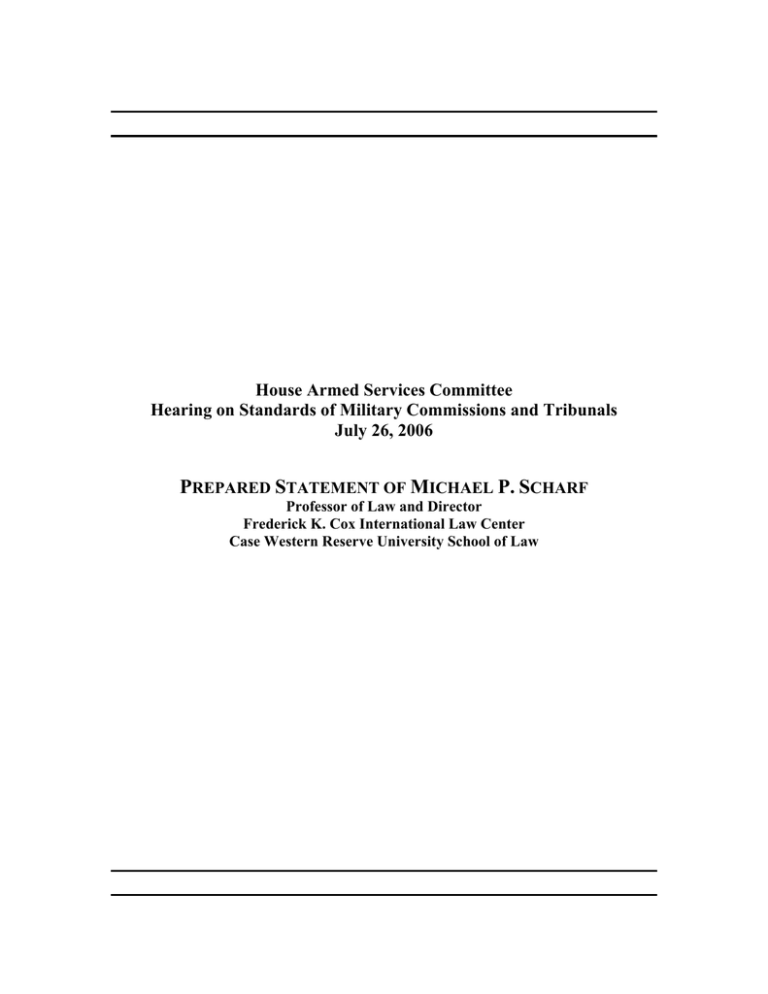
House Armed Services Committee Hearing on Standards of Military Commissions and Tribunals July 26, 2006 PREPARED STATEMENT OF MICHAEL P. SCHARF Professor of Law and Director Frederick K. Cox International Law Center Case Western Reserve University School of Law House Armed Services Committee Hearing on Standards of Military Commissions and Tribunals July 26, 2006 Prepared Statement of Michael P. Scharf Professor of Law and Director Frederick K. Cox International Law Center Case Western Reserve University School of Law I. Introduction Mr. Chairman, members of the Committee. I am Michael Scharf, Professor of Law and Director of the International Law Center at Case Western Reserve University School of Law. I have been asked to testify today as an expert on the Nuremberg and Tokyo Tribunals and the modern international criminal tribunals. During the first Bush and Clinton Administrations, I served as the Attorney Adviser in the Office of the Legal Adviser of the U.S. Department of State with responsibility for issues relating to war crimes prosecutions, and I helped draft the Statute and Rules of Procedure of the International Criminal Tribunal for the Former Yugoslavia – the first international war crimes tribunal since Nuremberg. I am the author of seven books about international criminal tribunals, including two that have won national book awards. I have trained the judges of the Yugoslavia Tribunal, Rwanda Tribunal, and most recently the Iraqi High Tribunal, and the War Crimes Research Office at Case which I supervise currently provides research assistance to five international war crimes tribunals.1 A full biography is attached. Mr. Chairman, thank you for the opportunity to address the Committee on the international standards of due process that are required for the Military Commissions under international law. II. Hamdan v. Rumsfeld Last month, in Hamdan v. Rumsfeld, the Supreme Court ruled that Article 21 of the Uniform Code of Military Justice (UCMJ), 10 U.S.C. Section 821, had conditioned the President’s use of military commissions on compliance with the “rules and precepts of the law of nations,” including in particular Common Article 3 of the Geneva Conventions of 1949, and other provisions recognized by the United States as customary international law such as Article 75 of Protocol I to the Geneva Conventions. 1 Case School of Law is also the only law school in the country advising the Prosecutor for the Office of Military Commissions. This program is run by my colleagues, Professors Amos N. Guiora and Gregory S. McNeal. 2 The Supreme Court held that the Military Commissions violated the required international rules of due process by: Authorizing the exclusion of the defendant from his own trial (whenever the government invokes “national security concerns” whether the particular evidence is actually classified or not). Permitting the admission of unreliable evidence (such as hearsay and evidence gained through coercion). Permitting witnesses to testify without disclosing their identities to the defendant (in order to protect intelligence sources and methods). Establishing review procedures that do not amount to an appeal to an independent higher court. The Supreme Court found it significant that these violations were also departures from the procedures employed in U.S. courts-martial, and that the Executive Branch had made no effort to specify why adherence to the courts-martial procedures “was not practicable” for trial of suspected al Qaeda terrorists, as required by Article 36 of the UCMJ. III. International War Crimes Tribunal Precedent The Right to be Present and to Appeal to a Higher Independent Court In his recent testimony before the Senate Judiciary Committee on July 11, the Deputy General Counsel of the Department of Defense, Paul Cobb, drew on the precedent of the Nuremberg and Tokyo Tribunals and the modern International Criminal Tribunals for the former Yugoslavia and Rwanda to argue that international law actually permits trials in absentia, use of hearsay evidence, use of anonymous witnesses, and other deviations from what is required in a United States Court-Martial proceeding. It is true, for example, that the Nuremberg Tribunal tried Hitler’s secretary, Martin Bormann in absentia (it was later discovered that he had actually been dead at the time of the trial). It is also true that the Nuremberg Tribunal admitted into evidence 300,000 unsworn affidavits. And it is true that the Nuremberg Tribunal granted no right of appeal, nor a right to challenge any of the judges. But international law has not accepted those practices. Rather, the legacy of the Nuremberg Tribunal was tarnished by such procedural shortcomings. Thus, following Nuremberg, U.S. Supreme Court Justice William O. Douglass remarked “I thought at the time and still think that the Nuremberg Trials were unprincipled,” and Chief Justice Harlan Fiske Stone characterized the Nuremberg trial as a “high-grade lynching party.” Even Nuremberg’s Deputy Prosecutor, Telford Taylor, acknowledged that “total reliance on untested depositions by unseen witnesses is certainly not the most reliable road to 3 factual accuracy.” And Nuremberg’s sister Tribunal, the Tokyo Tribunal, received even harsher criticism, with one of the Tokyo Tribunal’s own judges, Judge Henri Bernard of France, opining that “so many principles of justice were violated during the trial that the Court’s judgment certainly would be nullified on legal grounds in most civilized countries.” In the years following the Nuremberg and Tokyo trials, the international community took action to address the procedural deficiencies of the world’s first international war crimes tribunals. The 1949 Geneva Conventions provided for the first time a list of minimum required due process guarantees for any international or domestic war crimes proceedings. This list of due process safeguards was expanded in Article 75 of Additional Protocol I to the Geneva Conventions, which the Supreme Court in Hamdan v. Rumsfeld noted constituted customary international law. These due process guarantees were further elaborated upon in the Statutes and Rules of the International Criminal Tribunal for the Former Yugoslavia (1993), the International Criminal Tribunal for Rwanda (1994), and the International Criminal Court (1998), and the International Tribunals have repeatedly held that these due process rights are required of all war crimes prosecutions under international law. Each of the modern war crimes tribunals provide the following due process protections: the presumption of innocence; the right to be informed promptly and in detail of the charges and to have adequate time and facilities to prepare a defense and to communicate freely with counsel of choice; the right to be tried without undue delay; the right to be present during trial and to appointment of counsel; the right to have counsel present during questioning; the right to examine and confront witnesses; the right against self-incrimination and not to have silence taken into account in determining guilt; and the right to disclosure by the Prosecution of exculpatory evidence, and witness statements; and the right to appeal. It is noteworthy that even the Statute of the Iraqi High Tribunal, which was promulgated by U.S. Administrator Paul Bremer in 2003, includes these minimum due process rights. Thus, recourse to the Nuremberg and Tokyo experience cannot today be used to justify departure from these rights. Rather, any legislation on military commissions needs to reflect the practice of international humanitarian law as it has evolved over the last sixty years, not as it existed at the time of Nuremberg and Tokyo. The law has evolved and there is no doubt that we are bound by it. Consistent with these internationally recognized fundamental due process guarantees, there should be a right of appeal from the Military Commissions to the Court of Appeals for the Armed Forces, as in the case of courts-martial judgments under the UCMJ. Moreover, the defendant and his civilian counsel should be permitted to be present for all proceedings before the Commission, consistent with the internationally recognized right to be present at one’s trial. In the event that classified information must be considered, as Senator Specter has proposed, the Military Commission should employ a process similar to the Classified Information Procedures Act, which authorizes a presiding judge to sift through the information and make available to the defense only 4 whatever is directly relevant and exculpatory, with the option of providing redacted summaries or making stipulations of fact to protect sensitive intelligence sources and methods. See Cong. Rec., June 29, 2006, S6796-S6801 (Statement of Senator Specter). Use of Anonymous Witnesses Previous expert witnesses have brought to this Committee’s attention the fact that the Yugoslavia Tribunal has permitted use of “anonymous witnesses,” whose identity was withheld from the defendant. This precedent, they assert, supports a similar practice within the Military Commissions. It is true that in its very first case, the Yugoslavia Tribunal permitted the testimony of an “anonymous witness” (known only as witness “K”) whose identity was withheld from the defendant in order to protect the witness and his family from retaliation. See Prosecutor v. Tadic, No. IT-94-I-T (Aug. 10, 1995) (Decision on the Prosecutor's Motion Requesting Protective Measures for Victims and Witnesses). But this case is no longer good law. At the time of the Tadic decision, one of the three judges (Judge Stephens from Australia) filed a strong dissent, stating that the Yugoslavia Tribunal Statute "does not authorize anonymity of witnesses where this would in a real sense affect the rights of the accused.” Shortly thereafter in the American Journal of International Law, former Department of State Legal Adviser Monroe Leigh argued that the majority of the Trial Chamber struck the wrong balance between the protection of the witnesses and the rights of the accused. The right to examine or cross-examine witnesses guaranteed by the Yugoslavia Tribunal Statute, Leigh argued, cannot be effective without the right to know the identity of adverse witnesses. Leigh concluded that "it is a radical proposition to suggest that the minimum rights of the accused to a fair trial can be diminished in order to protect witnesses and victims," a point also made in Judge Stephen's dissent in Tadic. See Monroe Leigh, The Yugoslav Tribunal: Use of Unnamed Witnesses Against Accused, 90 Am. J. Int'l L. 235 (1996). See also Monroe Leigh, Witness Anonymity is Inconsistent with Due Process, 91 Am. J. Int'l L. 80 (1997). Subsequently, the Yugoslavia Tribunal rescinded the grant of anonymity for witness “K,” and the Tribunal has never since granted such a measure. In a later case, the Tribunal made clear that witness anonymity was only appropriate during the pre-trial phase, and that in any event a witness’s identity must be disclosed to the Defendant a reasonable time before testifying, although the witness’s identity may continue to be protected from the media and public. Prosecutor v. Blaskic, Decision on the Application of the Prosecutor requesting protective measures for victims and witnesses, 5 November 1996, at paras. 22-23. Thus, the Yugoslavia Tribunal precedent does not in fact support the use of anonymous witnesses in the Military Commission. Rather, the Yugoslavia Tribunal’s experience reaffirms that the international right of confrontation requires that the defendant know the identity of his accuser. 5 Hearsay Evidence Like the Military Commissions, the Rules of Procedure of the Yugoslavia Tribunal and Rwanda Tribunal allow the Trial Chamber to hear any evidence deemed to have probative value, including hearsay evidence. However, before admitting hearsay evidence, the International Tribunals require that a Trial Chamber must assess its “indicia of reliability.” Kordic and Cerkez, Appeals Chamber Decision on Appeal Regarding Statements of a Deceased Witness, 21 July 2000, at para 24. The American hearsay rule generally prohibits a court from using a person's assertion as equivalent to testimony of the fact asserted, unless the asserter is brought to testify in court where he may be probed and cross-examined as to the grounds of his assertion, his sincerity, and his credibility. The American rule against hearsay is not, however, absolute. The Federal Rules of Evidence contain various exceptions to the rule against hearsay, including a residual exception recognized for situations in which there are circumstantial guarantees of trustworthiness, if the court determines that: (a) the statement is offered as evidence of a material fact; (b) the statement is more probative on the point for which it is offered than any other evidence which the proponent can procure through reasonable efforts; and (c) the general purpose of these rules and the interests of justice will best be served by admission of the statement into evidence. Fed. R. Evid. 804(b)(5). The American hearsay rule reflects the view that hearsay is inherently less reliable than direct testimony in several respects. First, a hearsay declarant has not made a solemn oath or declaration before a judicial authority. In contrast, if he were to testify to matters under oath before the Tribunal, he would be more aware of the solemn nature of the proceedings, the importance of testifying truthfully and accurately, and the possible legal consequences of the failure to testify or to do so truthfully. Second, a hearsay declarant is not subject to face-to-face confrontation through cross-examination, which is fundamental to establish the reliability of the statement. As the U.S. Supreme Court has stated, "face-to-face confrontation generally serves to enhance the accuracy of factfinding by reducing the risk that a witness will wrongfully implicate an innocent person." Maryland v. Craig, 497 U.S. 836, 846 (1990). Third, if the person in the courtroom has either misheard or misremembered the hearsay statements he quotes, this would be almost impossible to establish through cross examination. Finally, the judges can only fully assess the credibility and veracity of these statements by observing the demeanor of the actual declarant while testifying. While recognizing the inherent unreliability of hearsay testimony, the Yugoslavia and Rwanda Tribunal judges have pointed out that as professional judges, as opposed to lay jurors, they are capable of assessing the appropriate weight and credibility of such statements. Fundamentally, the reason behind the common law’s relatively inflexible approach to hearsay evidence has been to ensure that lay jurors would not be unduly influenced by evidence that judges themselves knew, from experience, to be frail and 6 unreliable. It is significant that the International Tribunal judges have been careful to segregate hearsay from direct testimony in preparing their judgments. According to the caselaw of the Tribunals, hearsay evidence is to be considered “with caution.” In the recent Samanza case, the Rwanda Tribunal specified in its judgment which evidence had been hearsay and explained that such evidence had to be substantially discounted. Prosecutor v. Laurent Semanza, ICTR-97-20-T (May 15, 2003). In contrast to the International Tribunals, the Military Commissions are made up of military officers who are not usually legally trained, let alone judges with a lifetime of judicial experience under their belts. Thus, the international tribunal practice of accepting hearsay evidence without restriction may not in fact be appropriate for the Military Commissions. At a minimum, the Military Commissions should be required to assess the “indicia of reliability” before admitting hearsay, and should consider hearsay evidence “with caution,” consistent with the caselaw of the International Tribunals. Torture Evidence Reports by government officials and in the press include reports of Guantanamo detainees being subject to “water boarding” (simulated drowning), tied to a leash and led around like dogs, stripped naked, held in isolation for months on end and subjected to consecutive days of 20-hour interrogations, subjected to sleep deprivation, being chained hand and foot to the floor for eighteen hours or more without food or water, and being subjected to temperatures below freezing or well over one hundred degrees, having their genitals squeezed and thumbs bent back by interrogators, and being kept for months on end in isolation in a cell that was always flooded with light. See Neil A. Lewis, FBI Memos Criticized Practices at Guantanamo, December 7, 2004, at A19. Until the issuance of Military Commission Instruction No. 10 on March 27, 2006, on the eve of oral arguments in the Supreme Court in Hamdan v. Rumsfeld, the rules of the Military Commissions authorized admission of evidence even if it had been obtained through the most severe abuses constituting torture. While Military Commission Instruction No. 10 explicitly prohibited the Commission from admitting “statements established to have been made as a result of torture,” the rule did not bar use of evidence obtained through other forms of unlawful coercion, including cruel, inhuman or degrading treatment. In his recent testimony before the Senate Judiciary Committee, Steven Bradburry, acting Assistant Attorney General and head of the DOJ Office of Legal Counsel, argued that it was necessary to use evidence extracted using a variety of coercive techniques, including water boarding, which have been condemned by the European Court of Human Rights, the International Committee on Human Rights, and UN Human Rights Commission. See Aksoy v. Turkey, 1996-VI Eur. Ct. H.R. 2260; Aydin v. Turkey; 1997-V Eur. Ct. H.R. 1866; Selmouni v. France 1999-V Eur. Ct. H.R. 155; Selmouni v. France 1999-V Eur. Ct. H.R. 155, 183; Robert Goldman, Trivializing Torture: The Office of Legal Counsel’s 2002 Opinion Letter and International Law Against Torture,” 12 HUM. RTS. BR. 1 (2004) (and cases cited therein). 7 The prohibition against the use of evidence obtained by torture or other forms of unlawful coercion is one of the “judicial guarantees which are recognized as indispensable by civilized people” for purposes of Common Article 3(1)(d) of the Geneva Conventions. Thus, the Rules of Procedure of the Yugoslavia and Rwanda Tribunal each provide that “no evidence shall be admissible if obtained by methods which cast substantial doubt on its reliability or if its admission is antithetical to, and would seriously damage, the integrity of the proceedings.” ICTY Rule 95; ICTR Rule 95. The Rule, which was proposed by the United States, makes clear that the Tribunal must refuse to admit evidence – no matter how probative – if it was obtained by improper methods. Since the Tribunals do not utilize a pre-trial proceeding to determine admissibility of evidence, this rule is enforced not by keeping the fact finders from viewing such evidence, but rather by prohibiting reference to the inadmissible evidence in the written opinion of the Tribunal. Even the Iraqi High Tribunal has a provision excluding use of evidence obtained through torture or other forms of unlawful coercion. Rule 59, IHT Revised Rules of Procedure (adopted October 19, 2005), available at www.law.case.edu/saddamtrial. A clear statement by Congress rejecting the use of such evidence by Military Commissions (similar to Article 31(d) of the UCMJ) would have two important benefits. First, it would protect against the dangers of unfair trials, and would remove a stain clouding the legitimacy of these important trials in the eyes of the world. Second, it would serve an important prophylactic function in deterring practices that are abhorrent to international law. IV. The Later in Time Rule I understand that some in this room may favor the idea of responding to Hamdan by enacting legislation that would simply give Congressional authorization to the President’s existing Military Commission system without changing a thing. It is true that for purposes of domestic law, Congress can override the requirements of the 1949 Geneva Conventions if it enacts a later-in-time statute that manifests a clear intent to violate the provisions of these venerable international humanitarian law treaties, to which the United States is a ratifying party. See Breard v. Greene, 523 U.S. 371 (1998). However, Congress has always been extremely reluctant to use this power, as it renders the United States in breach of its international obligations with often serious international legal and diplomatic consequences. Do we really want to be the only country in the world to go on record as abrogating the Geneva Conventions? Since the United States military is more forward-deployed than all other nations combined, strict adherence to the Geneva Conventions is more important to us than any other nation. Since the United States is a world leader, our practice is followed by other nations. If we try detainees in violation of internationally-required fair trial procedures, we increase the risk that our own troops and those of our allies (such as Israel) will be 8 subject to similar mistreatment at the hands of others. And if by approving departure from the requirements of the Geneva Conventions, Congress is perceived as expressing disdain for some of the most important treaties of the international system, it will seriously complicate our diplomatic efforts to solve the Lebanon crisis, to eventually withdraw from Iraq, and to maintain support for our efforts to suppress terrorism worldwide. Some believe that increasing the standards of due process and admissibility of evidence for the Military Commissions would prevent the government from getting convictions. Thus, the Deputy General Counsel of DOD, Paul Cobb, told the Senate on July 11, 2006: “The evidence that the government has available to it in the war with al Qaeda is not always going to have the indicia of reliability that we would expect in our domestic criminal court proceedings.” The international tribunal due process rules that I have discussed today do not rise to the level of the protections afforded in a domestic criminal court proceeding. They do, however, provide enough protections to remedy the deficiencies in the existing Military Commissions. The internationally required standards may make it somewhat harder to obtain convictions in some of these cases. But in the broader scheme of things, we lose far more than a few trials when we insist on departing from the due process rights required by the Geneva Conventions and international law. V. Conclusion Perhaps no single issue better defines who we are as a nation then our treatment of detainees. I fully understand, based on my professional background, the enormous complexity of counter-terrorism policy, and deeply respect those bravely fighting terrorism world-wide. But denial of internationally recognized fundamental due process rights to detainees violates the core principles on which our great nation was founded, and in the long run will endanger American troops who have so bravely chosen to defend those sacred principles. 9 MICHAEL P. SCHARF Case Western Reserve University School of Law 11075 East Blvd. Cleveland, Ohio 44106-7148 Email: Michael.scharf@case.edu Phone: (216) 368-3299 Michael Scharf is Professor of Law and Director of the Frederick K. Cox International Law Center at Case Western Reserve University School of Law. In February 2005, Professor Scharf and the Public International Law and Policy Group, a Non-Governmental Organization he co-founded, were nominated for the Nobel Peace Prize by six governments and the Prosecutor of an International Criminal Tribunal for the work they have done to help in the prosecution of major war criminals, such as Slobodan Milosevic, Charles Taylor, and Saddam Hussein. During the first Bush and Clinton Administrations, Professor Scharf served in the Office of the Legal Adviser of the U.S. Department of State, where he held the positions of Counsel to the CounterTerrorism Bureau, Attorney-Adviser for Law Enforcement and Intelligence, Attorney-Adviser for United Nations Affairs, and delegate to the United Nations General Assembly and to the United Nations Human Rights Commission. In 1993, he was awarded the State Department's Meritorious Honor Award "in recognition of superb performance and exemplary leadership" in relation to his role in the establishment of the International Criminal Tribunal for the former Yugoslavia, including the drafting of its Statute and Rules of Procedure. A graduate of Duke University School of Law, and judicial clerk to Judge Gerald Bard Tjoflat on the Eleventh Circuit Federal Court of Appeals, Professor Scharf is the author of over fifty scholarly articles and seven books, including Balkan Justice, which was nominated for the Pulitzer Prize in 1998, The International Criminal Tribunal for Rwanda, which was awarded the American Society of International Law's Certificate of Merit for the Outstanding book in International Law in 1999, Peace with Justice, which won the International Association of Penal Law Book of the Year Award for 2003, and casebooks on The Law of International Organizations and International Criminal Law. Scharf is also the author of “The Cleveland Principles of International Law on the Detention and Treatment of Persons in Connection with the Global War on Terror,” a document endorsed by over 200 leading experts, which was provided to the U.S. Congress on the eve of the vote on the McCain Amendment. Professor Scharf has testified as an expert before the U.S. Senate Foreign Relations Committee; his Op Eds have been published by the Washington Post, Los Angeles Times, Boston Globe, Christian Science Monitor, and International Herald Tribune; and he has appeared on ABC World News Tonight, CBS Evening News, Nightline with Ted Koppel, The O=Reilly Factor, The NewsHour with Jim Lehrer, The Charlie Rose Show, the BBC=s The World, CNN, and National Public Radio. Professor Scharf also hosts an award-winning Blog on the Saddam Hussein Trial: www.law.case.edu/saddamtrial. Winner of the Case School of Law Alumni Association’s 2005 “Distinguished Teacher Award,” Professor Scharf teaches International Law, International Criminal Law, Human Rights Law, the Law of International Organizations, and a War Crimes Research Lab. In 2002, Professor Scharf established the War Crimes Research Office at Case Western Reserve University School of Law, which provides research assistance to the Prosecutors of the International Criminal Tribunal for Rwanda, the Special Court for Sierra Leone, the International Criminal Court, and the Iraqi Special Tribunal on issues pending before those international tribunals. Copies of over 120 of these research memos are available on the Frederick K. Cox International Law Center War Crimes Research Portal, at: www.law.case.edu/warcrimes-research-portal . 10
